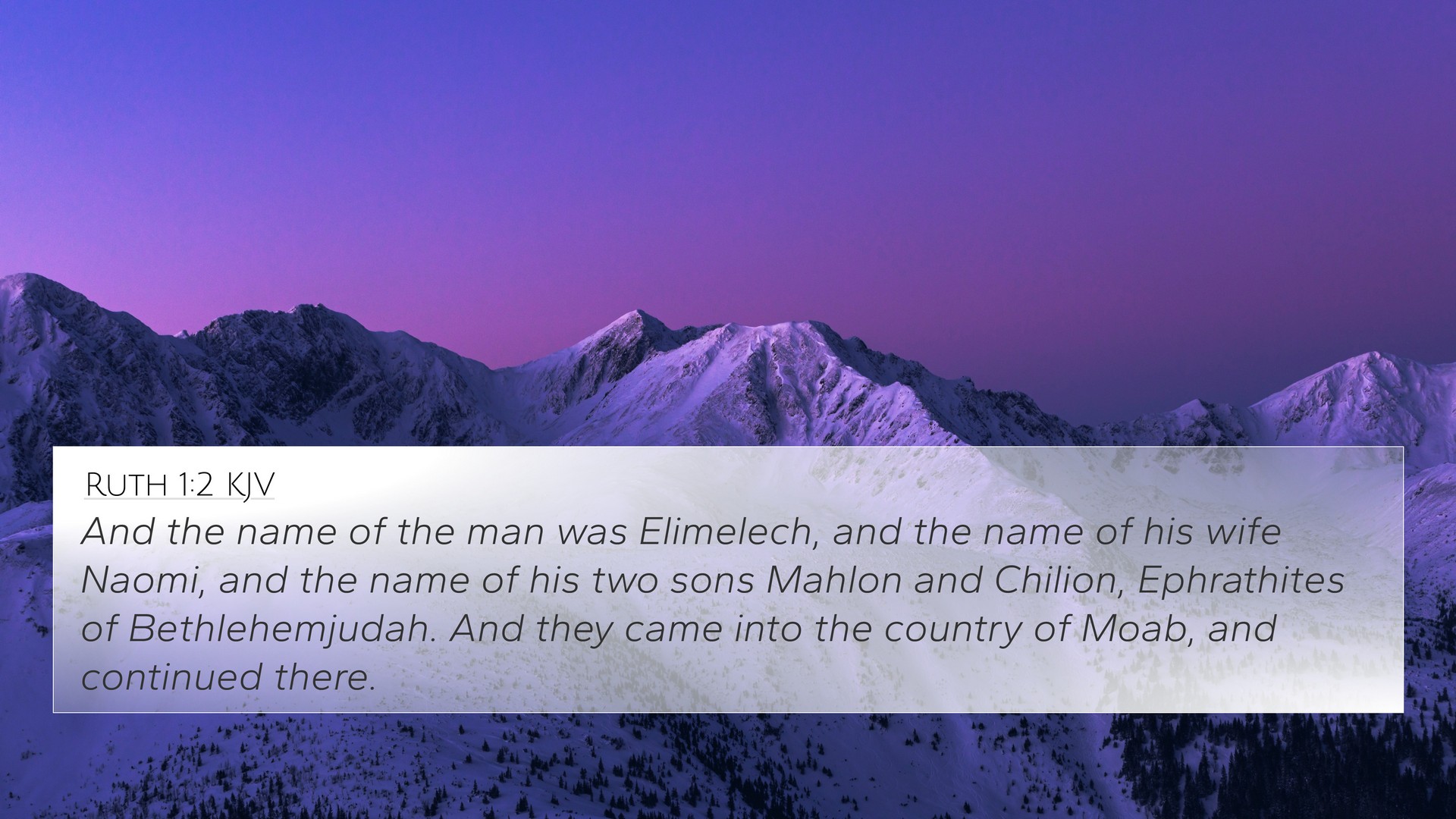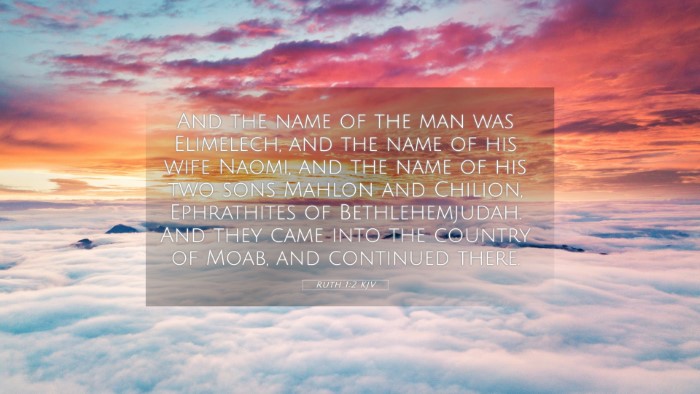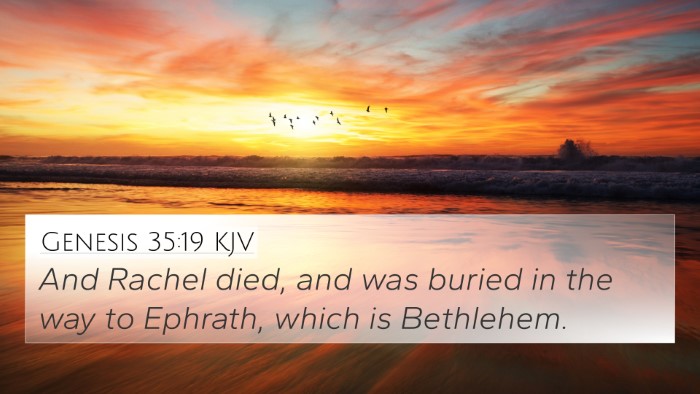Old Testament
Genesis Exodus Leviticus Numbers Deuteronomy Joshua Judges Ruth 1 Samuel 2 Samuel 1 Kings 2 Kings 1 Chronicles 2 Chronicles Ezra Nehemiah Esther Job Psalms Proverbs Ecclesiastes Song of Solomon Isaiah Jeremiah Lamentations Ezekiel Daniel Hosea Joel Amos Obadiah Jonah Micah Nahum Habakkuk Zephaniah Haggai Zechariah MalachiRuth 1:2 Similar Verses
Ruth 1:2 Cross References
And the name of the man was Elimelech, and the name of his wife Naomi, and the name of his two sons Mahlon and Chilion, Ephrathites of Bethlehemjudah. And they came into the country of Moab, and continued there.
Uncover the Rich Themes and Topics of This Bible Verse
Listed below are the Bible themes associated with Ruth 1:2. We invite you to explore each theme to gain deeper insights into the Scriptures.
Ruth 1:2 Cross Reference Verses
This section features a detailed cross-reference designed to enrich your understanding of the Scriptures. Below, you will find carefully selected verses that echo the themes and teachings related to Ruth 1:2 KJV. Click on any image to explore detailed analyses of related Bible verses and uncover deeper theological insights.
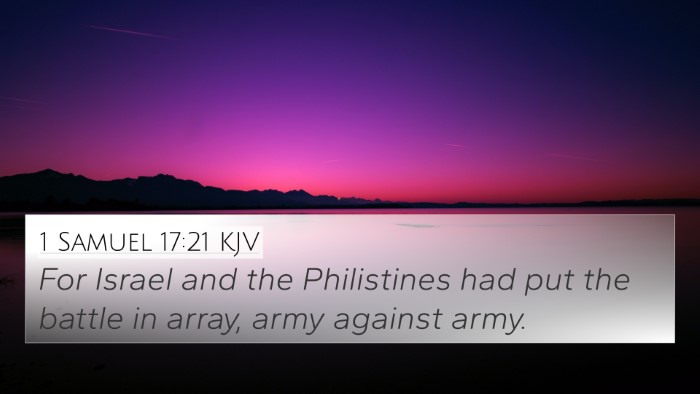
1 Samuel 17:21 (KJV) »
For Israel and the Philistines had put the battle in array, army against army.

Micah 5:2 (KJV) »
But thou, Bethlehem Ephratah, though thou be little among the thousands of Judah, yet out of thee shall he come forth unto me that is to be ruler in Israel; whose goings forth have been from of old, from everlasting.
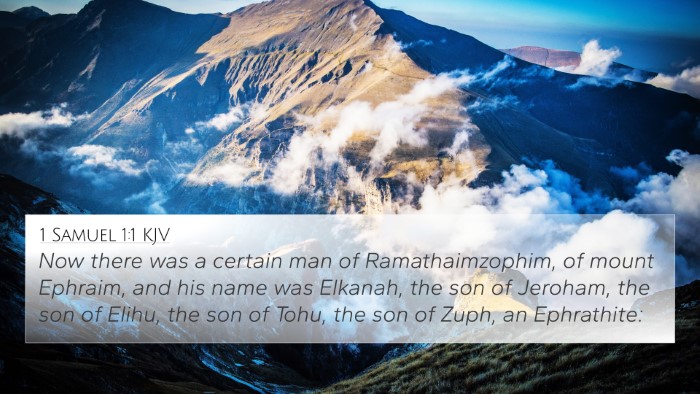
1 Samuel 1:1 (KJV) »
Now there was a certain man of Ramathaimzophim, of mount Ephraim, and his name was Elkanah, the son of Jeroham, the son of Elihu, the son of Tohu, the son of Zuph, an Ephrathite:
Ruth 1:2 Verse Analysis and Similar Verses
Understanding Ruth 1:2: A Comprehensive Exploration
Ruth 1:2 states: "And the name of the man was Elimelech, and the name of his wife Naomi, and the name of his two sons Mahlon and Chilion, Ephrathites of Bethlehemjudah. And they came into the country of Moab, and continued there." This verse introduces key characters in the Book of Ruth, setting the stage for the narrative that unfolds.
Character Analyses
- Elimelech: His name means "My God is King," which suggests a strong faith connection, indicating that despite the hardships, his identity is rooted in divine sovereignty.
- Naomi: Her name signifies "pleasant" or "sweet," contrasting with the bitterness she later experiences, which is pivotal in understanding her character arc through this narrative.
- Mahlon and Chilion: Their names mean "sickness" and "pining," hinting at the struggles and troubles that follow the family, foreshadowing their eventual fate.
Faith and During Trials
The move to Moab illustrates a significant step away from their homeland of Bethlehem, which symbolizes "House of Bread." In times of famine, the choice to leave can represent a crisis of faith, raising questions about reliance on God versus human solutions.
Historical and Contextual Background
Set during the time of the judges, this narrative reflects a period of lawlessness and moral decline in Israel. Understanding this context provides insight into the desperation that drove Elimelech's family to seek sustenance in a foreign land.
Comparative Biblical Exegesis
To enhance our understanding of Ruth 1:2, we can explore connections with other Bible verses:
- Genesis 19:36-38: The origins of the Moabites, who were descendants of Lot, which underscores the tension between Israel and Moab.
- Judges 21:25: The moral context of the time, "Every man did that which was right in his own eyes," illustrates the chaos that surrounded the family’s decision to leave Bethlehem.
- Matthew 1:5: A theological link to the genealogy of Jesus, showing Ruth's importance in the lineage of Christ, highlighting God's providence through unexpected routes.
- Psalm 37:25: This verse points to the faithfulness of God, assuring that the righteous will not be forsaken, which contrasts Elimelech's choice to leave Israel.
- Micah 5:2: Bethlehem's prophesied significance as the birthplace of the Messiah connects strongly to the narrative's initial setting.
- Deuteronomy 23:3-6: Restrictions against Moabites in Israelite society provide context for Ruth's later integration into Israel.
- Luke 4:25-27: Jesus makes allusions to Ruth's faith, showing her as a non-Israelite yet demonstrating great faith, which elevates her status in biblical history.
Thematic Connections
Ruth 1:2 can be viewed through various themes such as:
- Providence: Even in hardship, God has a plan for Ruth and Naomi that leads to divine restoration.
- Loss and Suffering: These experiences permeate the narrative, emphasizing the human condition and God’s role in our journeys through grief.
- Faithfulness: Ruth’s subsequent loyalty to Naomi showcases the biblical ideal of steadfast commitment amidst adversity.
Tools for Cross-Referencing
To study Ruth 1:2 in depth, the following tools may assist:
- Bible Concordance: A comprehensive index of biblical terms and their occurrences.
- Cross-reference Bible Study: Methods to observe the interconnectedness of biblical texts.
- Bible Reference Resources: Guides that highlight thematic connections and comparative analyses between verses.
Call to Action: Engaging with Cross-References
As you explore the rich tapestry of Bible verse connections, consider asking yourself:
- What verses are related to Ruth 1:2?
- How do the themes of loss and providence appear throughout the Bible?
- In what ways does this verse inform our understanding of faith in difficult times?
Final Thoughts
Ruth 1:2 serves not only as a historical marker but as a profound illustration of the interplay between human choice and divine providence. Through cross-referencing with other Bible verses, we can uncover a deeper understanding of the themes of faith, loss, and redemption that resonate throughout the Scriptures.
Conclusion
Understanding Ruth 1:2 encourages us to see beyond the immediate narrative and appreciate the broader biblical themes at work. Engage in comparative Bible verse analysis to witness how interconnected the scriptures are, enriching our spiritual walk and deepening our comprehension of God's timeless truths.
